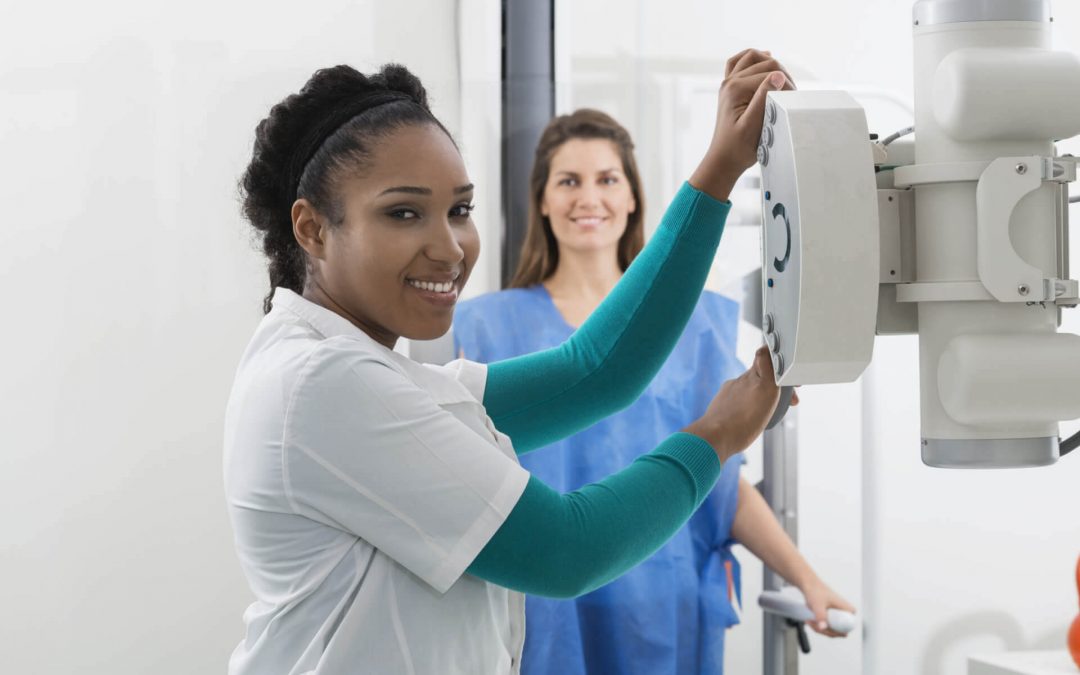Radiologic Technology
What is Radiologic Technology?
It’s the professional practice of creating medical diagnostic images through the use of ionizing radiation produced by specialized radiographic equipment.
The work requires physical activity such as lifting, standing for long periods of time, and moving heavy equipment. Operating the equipment requires physical stamina, as well as critical thinking and ability to perform mathematical calculations.
Radiologic Technologists perform direct care of patients, are highly adaptable in quick or changing circumstances, and communicate with physicians and other healthcare professionals. They must be CPR certified and hold professional licensure and certifications.
Before considering this career field, take some time to investigate the work. Observe radiographers working, speak with radiologic technology professionals, visit the Brookdale classrooms and labs, and speak with our faculty and students – these will help you better understand the profession, the learning requirements, and the job.
What form of training does Brookdale offer?
The Radiologic Technology Program is a full-time A.A.S. professional degree program. Students seeking admission to the program must meet specific program admissions requirements. Once admitted into the program, you will be in classroom instruction, laboratory practice, and clinical practice for 35-40 hours per week. During the first summer, you will participate in a 6-week, 40-hour clinical practicum, and in the second summer, a 3-week clinical practicum. Upon graduation, graduates sit for a national certification examination prior to obtaining a New Jersey radiography license to practice radiography.
Prospective students will complete a college application and program application. For the college application Start Here!
What competencies will I acquire?
Graduates of this program will be able to:
- Perform radiography procedures at a clinically competent level for an entry-level radiographer
- Communicate effectively with patients and peers
- Use critical thinking to achieve appropriate procedure outcomes
- Demonstrate professional and ethical behaviors as a health care provider
What’s the employment outlook?
About the Program
The program’s current award is for the maximum of 8 years. General program accreditation information and the current accreditation award letter can be found here.
The Radiologic Technology Program is accredited for eight years by the Joint Review Committee on Education in Radiologic Technology, JRCERT, located at 20 N. Wacker Drive, Suite 2850, Chicago, IL 60606-3182 (Phone: 312-704-5300) and the New Jersey Radiologic Technology Board of Examiners, located at 25 Arctic Parkway, Trenton, NJ 08625 (Phone 609-984-5890).
Request More Information: Radiologic Technology
Radiologic Technology Degrees & Curriculum
Brookdale offers the following degree in Radiologic Technology. Click on the degree name to read more in our online catalog.
Pre-Radiologic Technology
Program to track Nursing applicants after they have graduated from SOCHS/SOCRT prog
Link to prerequisites and requirements
Radiologic Tech Track
Effective Spring 2014. This option is designed for students seeking a career in health sciences. Students will have the option of finishing this program and transferring to a four-year institution to complete their Bachelor’s degree or transitioning to, upon completion of admission requirements, one of the College’s A.A.S. degrees in Nursing, Radiologic Technology, Respiratory Care, Dental Hygiene or Medical Laboratory Technology as much of the general education course work is the same. AAS health science programs have admissions requirements and application procedures that are available in the College Catalog.
Link to prerequisites and requirements
Radiologic Technology Program, A.A.S.
This program prepares students for entry-level positions in diagnostic imaging. Students work with patients, performing a full range of diagnostic radiographic procedures. Clinical experiences are required of all students. Graduates are employed by hospitals, clinics, diagnostic imaging centers, and physician’s offices. Upon completion of the Radiologic Technology Program, students will be eligible to sit for the American Registry of Radiologic Technologists examination in Radiography. After successful completion of this examination and application to the Board of Radiologic Technology Examiners, the graduate is also eligible for state licensure.
Link to prerequisites and requirements
Radiologic Technology Programs Passing Grade is 74% or better in order to pass RADT course.
Specific admission criteria for the program are outlined in the Admission and Registration section of the catalog. Separate policies exist for the Radiologic Technology Program, including grading.
Graduates of this program will be able to:
- Perform radiography procedures at a clinically competent level for an entry-level radiographer
- Communicate effectively with patients and peers
- Use critical thinking to achieve appropriate procedure outcomes
- Demonstrate professional and ethical behaviors as a health care provider
Graduation Requirements
Radiologic Technology students must fulfill the program degree requirements as well as meet all ARRT and New Jersey Bureau of Radiologic Examiners clinical competency requirements.
- Didactic and Clinical Competency Requirements—effective Jan. 1, 2022
Brookdale Community College is an Equal Opportunity educational institution. In order to promote this goal, the College makes positive efforts to ensure equal opportunity to all individuals without regard to race, color, sex, religion, national origin, disability or veteran status.
- The program is accredited by the Joint Review Committee on Education in Radiologic Technology, 20 North Wacker Drive, Suite 900, Chicago, Illinois 60606, (312) 704-5300 www.jrcert.org, and the Radiologic Technology Board of Examiners, 25 Artic Parkway, Trenton, NJ 08625, Phone (609) 984-5890.
Transfer Opportunities
Transfer Agreements by Academic Program: Articulation Agreements are formal agreements between Brookdale and other colleges and universities. These agreements define how the courses you complete at Brookdale will apply to your future bachelor’s degree when you transfer into a baccalaureate program.
 Bookstore
Bookstore  Self Service
Self Service 
